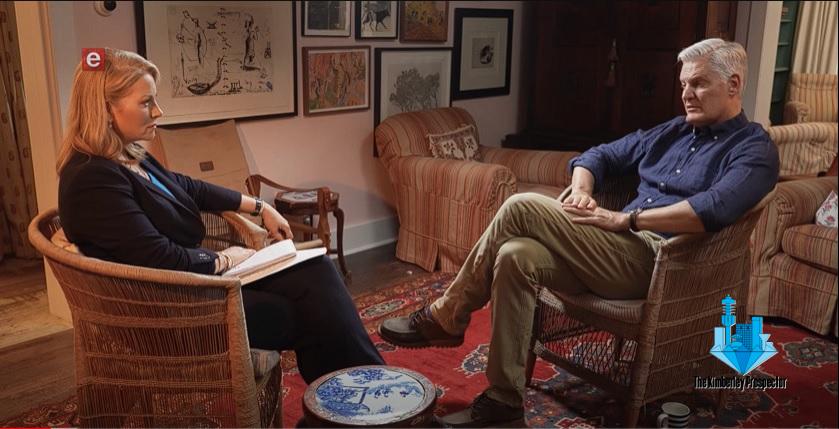In an exclusive interview with Annika Larsen of Eskom, CEO André de Ruyter opened up about his experience fighting corruption at the company and the attempts on his life.
De Ruyter took on the job of Eskom CEO in 2017. At the time, he was unaware of how systemic the corruption was. He soon discovered that state capture had metastasized throughout the organization. He uncovered multiple frauds, cartels, saboteurs, procurement irregularities, and political interference. He estimated that a billion Rand was being stolen from Eskom every month.
De Ruyter was also baffled by the resistance to the just energy transition and decolonization of the South African economy, which would protect the environment, grow the economy, address energy security, and create employment. In addition, he highlighted the need to address the environmental pollution that is causing 29,000 people to die prematurely every year. Through the retirement of 22 gigawatts of coal-fired capacity, Eskom would be able to release 40 billion litres of water back into the Vaal River system. This would be enough for 200 million people.
Despite his best efforts to fight corruption and transition to clean, renewable energy, De Ruyter experienced a lack of political support. He was even accused of treason by a minister, with no apology from anyone in the cabinet. To make matters worse, a listening and tracking device was found in his car. He believes it was a government device and that somebody wanted to access information to run intelligence campaigns.
De Ruyter resigned after three years of fighting corruption and pushing for the transition to renewable energy. Despite the difficult circumstances, he is proud of the progress made, and remains hopeful that the just energy transition and decolonization of the South African economy will still happen.
De Ruyter also discussed the response from high-level members of government and the National Prosecuting Authority (NPA) when he presented evidence of corruption. Despite the officials’ initial shock, nothing followed from their promises to act.
De Ruyter also addressed his concerns about the potential of Eskom being a ‘feeding trough’ for the African National Congress (ANC), to which he received a pragmatic response from a senior government minister.
The CEO then went on to describe the poisoning incident that occurred on 12th December 2020. He asked for a cup of coffee, only to find out later that someone had added a cyanide and sodium arsenite (rat poison) cocktail to it. He recalled feeling nauseous, off balance, confused and gasping for air, before vomiting copiously. After visiting his GP, De Ruyter was administered a drip of high-dose vitamin B, which was believed to have saved his life.
Despite being a serious attack on the state, the South African Police Service only sent two middle-aged detective sergeants to take De Ruyter’s statement. This suggests either monumental incompetence or a lack of interest in investigating the matter.
When asked if Eskom can be fixed, De Ruyter noted that its current state cannot be returned to its former glory. He highlighted the need for better governance and for politicians to make decisions with a long-term view, rather than focus on the next election. He also stressed the importance of investing in the latest technologies to create a cost-competitive system.
De Ruyter warned of the potential consequences of a total collapse of the grid, citing the example of the 1970s blackout in New York, which led to widespread looting and crime. He praised the skilled engineers working in the national control system and stressed the importance of balancing the need to keep the lights on with the damage caused by load shedding to the economy.
De Ruyter opened up about the severe effects of corruption in South Africa’s energy industry. He spoke of the Kusile power station, where three units had to be shut down due to a collapsed flu duct, and the manipulation of design criteria to ensure that Hitachi, the investment arm of the ANC, got the contract.
De Ruyter also discussed the emergency procurement of a car powership, which has a Legacy of alleged corruption breaches of contract and abuse. Although this contract was for 20 years, he expressed concern that the company could sail away with the asset the country paid for. Additionally, he pointed out the resistance to enhanced anti-bribery and Corruption Clauses.
De Ruyter spoke of Russia and its recent visit by the Russian minister of energy to South Africa. He stated that although he was speculating, soon after the visit, a request was made to transfer three ageing power stations to the Central Energy fund.
De Ruyter concluded the interview by discussing his plans to take a holiday with his family, and his hope to continue to make a contribution to combating climate change. He also warned the next Eskom CEO to have a sense of humour and keep a lower profile.
Despite the failure to meet the readily measurable objectives of load shedding, de Ruyter believes he was able to make a difference in setting South Africa’s agenda when it comes to its power system, environment, and climate change. He concluded by expressing his honour of having served South Africa and the brilliant people he met along the way.
Tags: Andre de Ruyter Eskom